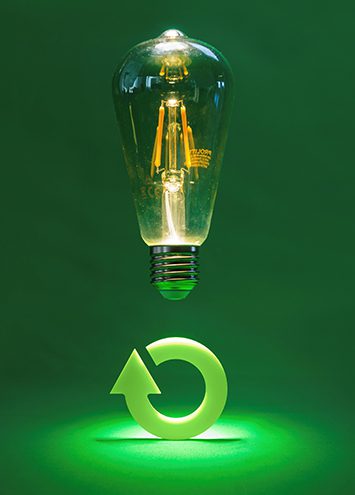
The WEEE system is changing in 2019. Nigel Harvey, Chief Executive of lamp recycling specialist Recolight provides an overview
More product coming into scope
From 2019, WEEE moves from “closed scope” to “open scope” in its applicability to the different types of electrical product. Previously, products were only included if they were in one of 14 categories. But now, open scope means virtually all electric products must comply. That means the following are now included:
• Household luminaires
• Gas boilers
• Wiring accessories (such as plugs, sockets, and switches)
• Air conditioning systems
A few electric products still remain out of scope, particularly if the electric function is ancillary to the product’s basic function. Examples include furniture with a USB charging connector, and clothing with novelty lights. Incandescent light bulbs, components, and reels of electric cable remain out of scope.
Producers selling these now-relevant products need to join a WEEE scheme. And when the new products arise as waste, they should be classified as WEEE. Updated protocols, which take the new products into account, are being developed for classifying WEEE collected at household waste recycling centres. Once finalised, recyclers will need to use the new protocols to apportion WEEE to the different categories.
Note that the UK has not adopted the six WEEE categories used in most EU countries. Instead, the UK will retain 14 WEEE categories. This decision does not arise from any Brexit policy position. It is simply a pragmatic approach supported by most producers in a Government consultation.
Mandatory WEEE Balancing System
Currently, local authorities can insist that a WEEE scheme collects their WEEE, if there is no contract in place for it. To address the risk to a scheme of receiving such a request, most schemes joined a voluntary “Balancing System” in 2016. The Balancing System ensures that such requests are handled efficiently, and fairly. The Government has announced that a Balancing System will be mandatory in 2019, and is expected to consult on the system shortly. Once implemented, this will result in a fairer WEEE system, with all schemes required to share the costs of excess local authority WEEE.
Online marketplaces
At the end of last year, the Government released its Resources and Waste Strategy. This included a commitment to explore options for tackling what they say are the growing numbers of internet sellers who do not meet their WEEE obligations.
WEEE Charges
In 2019, the WEEE charges payable by producers registered in England will increase (other parts of the UK are unaffected). WEEE schemes based in England will also be required to pay an annual charge.
More to come?
The Government will publish its Post Implementation Review of the 2013 WEEE regulations during the year. This review could well indicate if further changes to the WEEE system are being contemplated.








